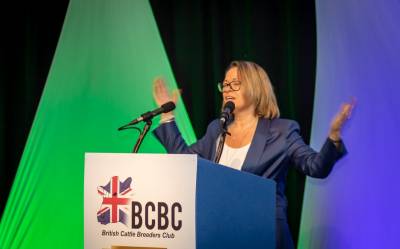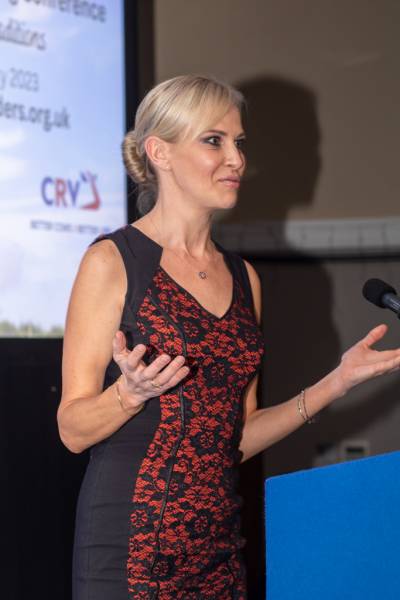

Improving the productivity, efficiency and sustainability of beef and dairy production was the focus of the British Cattle Breeders Club conference held in Telford last week (24th and 25th January).
An impressive line-up of speakers including renowned scientists and researchers and leading farmers tackled how the industry needed to ‘challenge traditions’ to meet current and upcoming challenges.
“The beef industry is destroying the planet! Leading scientists and top nutritionists believe that statement is the biggest lie of our century,” said Lucianne Allen, sales and marketing director for Aubrey Allen in her opening presentation. “This lie is funded by people who don’t care about the soil and land as you all do, but whose vision is the destruction of the meat industry to make as much cash as they can.” These factions were currently winning “the war against meat” but she reminded delegates that meat was a valuable source of nutrition and that “people want to eat meat”.
“I believe we have the expertise and the passion, the only thing missing is unity. Together we are a multi-billion pound industry. What can we do to get our stories out there?”
Canadian farmer Arron Nerbas encouraged delegates to be open to change and to other people’s viewpoints. “There is real change coming for agriculture – pressures that we have never seen before. It is important to be ahead of the curve.”
Livestock are part of the climate change problem, so it’s important to address the issues so that they can be part of the solution, said Prof Geoff Simm. “Beef has a mixed balance sheet – we need to enhance our assets and reduce liabilities. Science and technology are vital but alone they can’t fix the challenges – other interventions are needed too.”
Opening day two (Dairy Day) Dr Judith Bryans, CEO of Dairy UK outlined the ‘vast opportunity’ that global population growth brought the sector. She said that more than 99% of households in Great Britain purchased dairy products which provided high quality nutrition in a “tasty package”.
“Consumers need food that is sustainable and provides high quality nutrition,” she said. “The opportunity for us is to position ourselves as leaders so we can continue to feed the world.”
Phil Garnsworthy, Professor of Dairy Science at University of Nottingham’s School of Biosciences and recipient of the Sir John Hammond Award in 2022 discussed the link between fertility, efficiency, emissions and profit. Milk yield per cow is the main driver of production efficiency and milk yield per hectare is the main driver of whole-farm efficiency, he said. However efficiency gains may be partly offset by lower fertility. He encouraged delegates to consider the three pillars of sustainability – society and economics as well as the environment – and that improving fertility has positive effects on all three.
Pieter van Goor from CRV and farmer Wietse Duursma shared their experiences of improving feed efficiency in The Netherlands. Pieter said: “The 25% best cows for feed efficiency in your herd need a quarter less feed to produce the same amount of fat and protein corrected milk as the lower performing cows.” As well as lower feed costs, that meant lower methane emissions and less manure, he said. Wietse said that collecting data had been central to his success with improving feed efficiency on his own farm. “I’m extremely focused on high input, health and breeding of course because that brings extra money to the table.”
Flintshire farmer Rhys Davies shared his learning from a study tour visiting grass-based herds in Ireland. It inspired him to come home and examine his management in detail including routine grass measuring and genomic testing. “Not doing genomic testing on heifer calves would be like not walking the paddocks once a week. It will just leave you blind not knowing what to do.” He looks for protein percentage, which was more important to him than kilos. Fertility was also very important he said.
Walford College’s farm manager Tom Moore and Sean Chubb, Lead Pasture to Profit Consultant with LIC ran through the enormous changes they have implemented to ensure the future of the college’s dairy herd. Tom took on management of the herd in 2018 and realised numerous challenges with costs and herd health. Their plans focus on lowering costs and increasing the value of milk with early decisions including turning the cows out nine to ten months per year, creating an autumn calving block and increasing milk from forage. This in turn led to decisions to move to a milk solids based contract and to implement a cross breeding policy, bringing in Jersey genetics. “The biggest reason for this was hybrid vigour, he said. “To put it simply, hybrid vigour means one plus one equals three,” said Sean.
“In the first year we halved the £4,500 loss and we’ve been progressively getting better and better,” he continued. “The last couple of seasons have been around break even. Adding value to milk is just starting to happen and hopefully as more of the genetics come through we will be able to lift the value of the milk and we’ll be able to improve profitability further.”
Charity auction for Farming Community Network
A charity auction raised just over £3,200 for Farming Community Network (FCN). Organised as part of the BCBC’s 75th anniversary celebrations on 24th January lots included a day’s shooting, straws of semen and various gift items.
Senior Partnerships Manager for FCN Georgina Lamb said the charity was ‘very much in synch’ with the conference’s Challenging Traditions theme. “We’re challenging the stigma associated with asking for help,” she explained. “I’m a beef farmer’s daughter and I know how stoic people can be when faced with adversity and difficulties.
“FCN are here to support anyone in the farming community that is struggling no matter what the challenges. Whether it is personal, business or diversification, FCN are here to support. We’re a completely confidential organisation and we rely on the sector to support us so massive thanks to the Club for choosing FCN as your charity.”
The FCN helpline is available on 03000 111 999 from 7am to 11pm every day of the year. For more information on FCN visit https://fcn.org.uk/